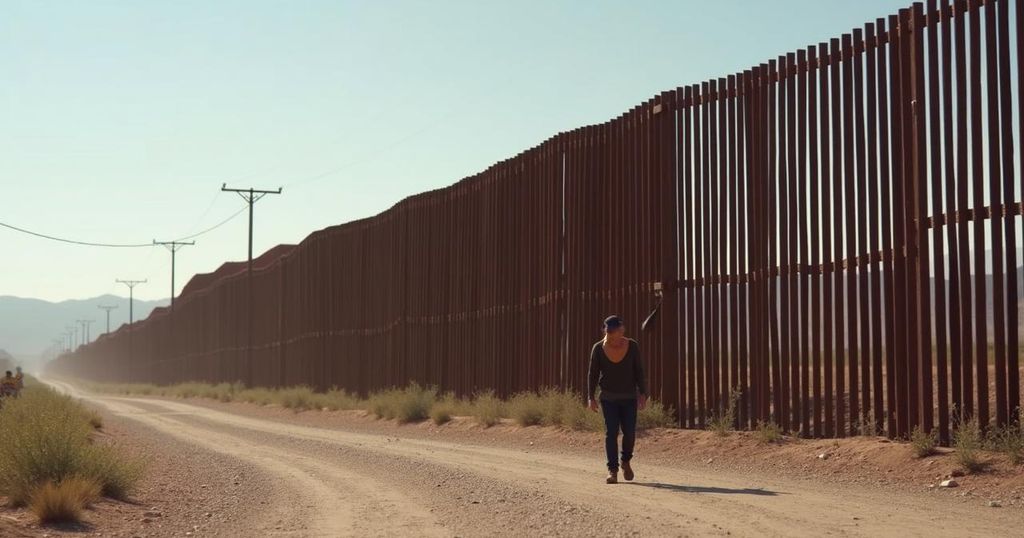Strengthening Border Control: Mexico’s Role as the U.S. Election Approaches
With the U.S. presidential election approaching, Mexico has bolstered border enforcement measures, resulting in a marked decrease in migrant crossings into the United States. This shift is attributed to a strategic agreement between the Biden administration and Mexico, driven by economic interests and political pressures. As migrant encounters drop significantly, those still attempting to reach the U.S. face difficult and often dangerous conditions in Mexico, raising critical ethical questions about the treatment of migrants during this politically charged period.
As the United States approaches a pivotal presidential election, Mexico has intensified its border enforcement measures, leading to a significant decline in migrant crossings. Analysts attribute this downturn to a tacit yet strategic understanding established between the Biden-Harris administration and the Mexican government in late 2023. The motivation for Mexico, under President Claudia Sheinbaum, is twofold: maintaining economic stability through the uninterrupted flow of exports to the U.S., and avoiding political repercussions that could arise from increasing migrant chaos within its territory during an election year. Recent data indicates a drastic reduction in migrant encounters at the U.S. border—falling from nearly 250,000 in December to below 60,000 last month, marking one of the lowest monthly totals in several years. Concurrently, Mexico’s immigration agency has recorded an increase in migrant interactions within its own borders, suggesting a significant shift in enforcement tactics. The experiences of Venezuelan migrants Mari Eduvid Sarmiento and Samuel Malave highlight the challenges faced by many hopefuls seeking to reach the U.S. They have been stalled in Mexico City after navigating a perilous journey that included evading Mexican immigration agents and enduring physical hardships. The Mexican government’s approach, which now includes visa restrictions and rigorous oversight of migration routes, has drastically altered the landscape for those attempting to cross into the U.S. In December 2023, President Biden engaged with President Sheinbaum, resulting in changes aimed at curtailing illegal crossings that threatened to exacerbate political tensions in the U.S. Such negotiations have included implementing stricter enforcement measures and repositioning customs officers to assist the Border Patrol. These actions have effectively constrained the migration flow and served American electoral interests by minimizing the immediate humanitarian crisis at the border. Despite these improvements to border enforcement, significant ethical questions arise regarding the impact on migrants, many of whom now find themselves subjected to harsh conditions in Mexico and at risk of extortion and violence. The current predicament illustrates a controversial balancing act: fostering economic cooperation while addressing sensitive immigration issues, a dynamic that has led to Mexico ‘weaponizing’ migration for political leverage, as noted by experts.
The ongoing situation at the U.S.-Mexico border is deeply intertwined with the political landscape in the United States. In anticipation of the upcoming presidential election, U.S. officials have sought to engage Mexico in border enforcement negotiations to reduce the number of migrants attempting to cross into the U.S. These negotiations have resulted in a more rigorous enforcement regime inside Mexico, influencing migration patterns and creating a stark contrast to the circumstances faced by migrants in previous years. As a result, while the number of migrants reaching the U.S. border has plummeted, the experiences of those still en route to the U.S. have become increasingly fraught and dangerous. The strategic interests of both countries have compelled Mexico to adopt a more restrictive approach toward migration, reflecting a pragmatic, albeit ethically complex, partnership amid rising political stakes.
In summary, as the U.S. election draws near, Mexico’s enhanced border enforcement has led to a substantial decrease in illegal crossings, ostensibly for economic and political reasons. However, the resultant humanitarian consequences for migrants indicate a complex and morally challenging interplay between national interests and individual rights. With both governments maintaining a precarious balance between cooperation and enforcement, the situation remains an evolving challenge requiring careful scrutiny and ethical consideration.
Original Source: www.usatoday.com




Post Comment